官方文档,https://www.jenkins.io/zh/doc/book/pipeline/shared-libraries/
1.什么是共享库
共享库并不是一个全新的概念,平时我们在写python,java等语言的时候,会引用各种包,比如import xxx from xxx。类似编程语言中的 代码复用 ,不同阶段可能有 共用 的地方
在Jenkins的共享库中使用Groovy的语法,共享库中存储了Groovy的各种类,每个文件又可以编写各种的方法
2.共享库的结构
一般来说,共享库的结构分为可以分为resource,src,vars。其结构如下
(root)
+- src # Groovy source files
| +- org
| +- foo
| +- Bar.groovy # for org.foo.Bar class
+- vars
| +- foo.groovy # for global 'foo' variable
| +- foo.txt # help for 'foo' variable
+- resources # resource files (external libraries only)
| +- org
| +- foo
| +- bar.json # static helper data for org.foo.Bar(root)
+- src # Groovy source files
| +- org
| +- foo
| +- Bar.groovy # for org.foo.Bar class
+- vars
| +- foo.groovy # for global 'foo' variable
| +- foo.txt # help for 'foo' variable
+- resources # resource files (external libraries only)
| +- org
| +- foo
| +- bar.json # static helper data for org.foo.Bar参数解释
| 参数 | 说明 |
|---|---|
| resource | 目录允许从'外部库中'使用步骤来'加载相关联的非Groovy的资源文件 |
| src | 目录主要存放我们要'编写的groovy类',执行流水线时,此目录将添加到class_path中 |
| vars | 是用来放各种参数文件,定义变量 |
==其实也不是只有这些,一层目录也可以放诸如doc等文件来放文档。这都根据实际的需要==
3.jenkins上 配置做
manage Jenkins-----> configure system --->ctrl+f(Google浏览器)--->lib进行定位---->Global Pipeline Librariesmanage Jenkins-----> configure system --->ctrl+f(Google浏览器)--->lib进行定位---->Global Pipeline Libraries- 步骤
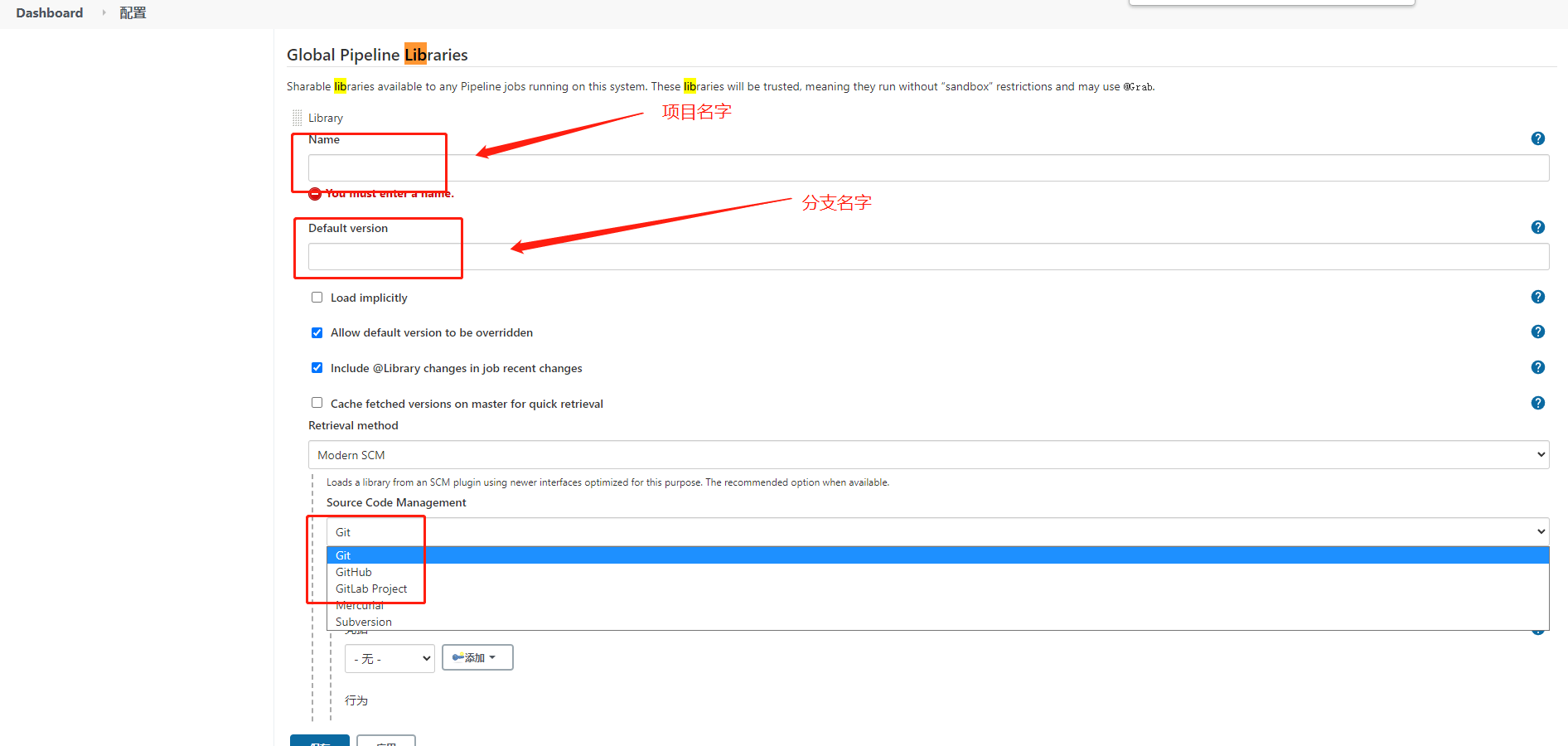
4.使用
在groovy脚本中的使用:@Library("库名称@分支") 这个库名称和分支就是在jenkins中设置的名称
调用方式:
@Library('jenkinslib@master') _
def tools = new org.devops.tools()
//jenkinslib 这个名字随便写,不是仓库名字决定,但是这个名字必须和jenkins 配置共享库的名字一致
//注释,org.devops.tools 是src里脚本的位置,导入调用@Library('jenkinslib@master') _
def tools = new org.devops.tools()
//jenkinslib 这个名字随便写,不是仓库名字决定,但是这个名字必须和jenkins 配置共享库的名字一致
//注释,org.devops.tools 是src里脚本的位置,导入调用- 多个库调用
// 加载mylib共享库
@Library('mylib') _
// 加载mylib共享库的1.0版本
@Library('mylib@1.0') _
// 加载多个共享库, mylib共享库的默认版本, yourlib共享库的2.0版本(分支)
@Library(['mylib', 'yourlib@2.0']) _// 加载mylib共享库
@Library('mylib') _
// 加载mylib共享库的1.0版本
@Library('mylib@1.0') _
// 加载多个共享库, mylib共享库的默认版本, yourlib共享库的2.0版本(分支)
@Library(['mylib', 'yourlib@2.0']) _#!groovy
@Library('jenkinslib@master') _
def tools = new org.devops.tools()
pipeline{
agent{
node{
label "master"
}
}
stages{
stage("Build"){
steps{
script{
tools.PrintMes("执行打包","green")
}
}
}
}
}#!groovy
@Library('jenkinslib@master') _
def tools = new org.devops.tools()
pipeline{
agent{
node{
label "master"
}
}
stages{
stage("Build"){
steps{
script{
tools.PrintMes("执行打包","green")
}
}
}
}
}4.1共享库创建
在src/org/devops目录中创建utils.groovy文件,内容如下
package org.devops
def getVersion(String BUILD_NUMBER, String GIT_COMMIT){
return new Date().format('yyMM')+"-${BUILD_NUMBER}"+"-${GIT_COMMIT}"
}package org.devops
def getVersion(String BUILD_NUMBER, String GIT_COMMIT){
return new Date().format('yyMM')+"-${BUILD_NUMBER}"+"-${GIT_COMMIT}"
}4.2pipeline中的使用
#!groovy
@Library('jenkinslib@master') _
def util = new org.devops.utils()
pipeline{
agent{
node{
label "master"
}
}
stages{
stage("Build"){
steps{
script{
def v = util.getVersion("${BUILD_NUMBER}","${GIT_COMMIT}")
echo "${v}"
}
}
}
}
}#!groovy
@Library('jenkinslib@master') _
def util = new org.devops.utils()
pipeline{
agent{
node{
label "master"
}
}
stages{
stage("Build"){
steps{
script{
def v = util.getVersion("${BUILD_NUMBER}","${GIT_COMMIT}")
echo "${v}"
}
}
}
}
}4.3resource
使用resource/里的文件
用法:
1.resources/xxx.json文件
cat jenkinslib/resources/config.json
{
"name": "jin tian"
}cat jenkinslib/resources/config.json
{
"name": "jin tian"
}2.vars/Pipeline.groovy
cat jenkinslib/vars/Pipeline.groovy
import hwf.devops.Tools
def call(Map args){
def tools = new Tools()
pipeline {
agent { label "build"}
stages{
stage("build"){
steps{
script{
//加载resource里的文件
config = libraryResource '/config.json'
config = readJSON text: config -"\n"
value = tools.PrintMsg("hwf")
println(config.name)
}
}
}
}
}
}cat jenkinslib/vars/Pipeline.groovy
import hwf.devops.Tools
def call(Map args){
def tools = new Tools()
pipeline {
agent { label "build"}
stages{
stage("build"){
steps{
script{
//加载resource里的文件
config = libraryResource '/config.json'
config = readJSON text: config -"\n"
value = tools.PrintMsg("hwf")
println(config.name)
}
}
}
}
}
}5.案例
5.1颜色案例
注意:我们需要安装 插件AnsiColor,这样才能使用ansiColor()方法,可以在片段生成器查看更多的用法
ansiColor('css') {
sh "ls -al"
}
echo 'this will be rendered as-is'
// multiple ansiColor steps within one pipeline are also supported
ansiColor('vga') {
echo '\033[42m\033[97mWhite letters, green background\033[0m'
}ansiColor('css') {
sh "ls -al"
}
echo 'this will be rendered as-is'
// multiple ansiColor steps within one pipeline are also supported
ansiColor('vga') {
echo '\033[42m\033[97mWhite letters, green background\033[0m'
}- 创建tool.groovy
package org.devops
//格式化输出
def PrintMes(value,color){
colors = ['red' : "\033[40;31m >>>>>>>>>>>${value}<<<<<<<<<<< \033[0m",
'blue' : "\033[47;34m ${value} \033[0m",
'green' : "\033[40;32m >>>>>>>>>>>${value}<<<<<<<<<<< \033[0m" ]
ansiColor('xterm') {
println(colors[color])
}
}package org.devops
//格式化输出
def PrintMes(value,color){
colors = ['red' : "\033[40;31m >>>>>>>>>>>${value}<<<<<<<<<<< \033[0m",
'blue' : "\033[47;34m ${value} \033[0m",
'green' : "\033[40;32m >>>>>>>>>>>${value}<<<<<<<<<<< \033[0m" ]
ansiColor('xterm') {
println(colors[color])
}
}在var路径下创建一个hello.groovy的文件,我们只输出一个hello
- 创建hello.groovy
def call(){
println("hello")
}def call(){
println("hello")
}- 使用共享库
系统配置里找到 Global Pipeline Libraries
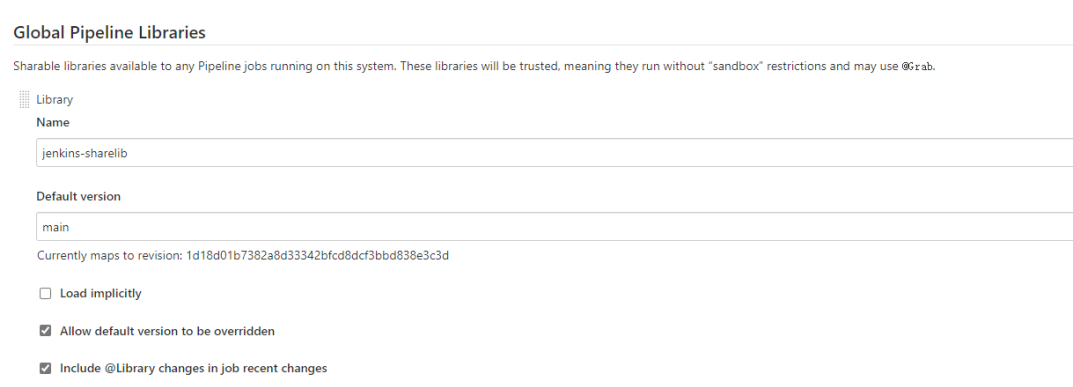
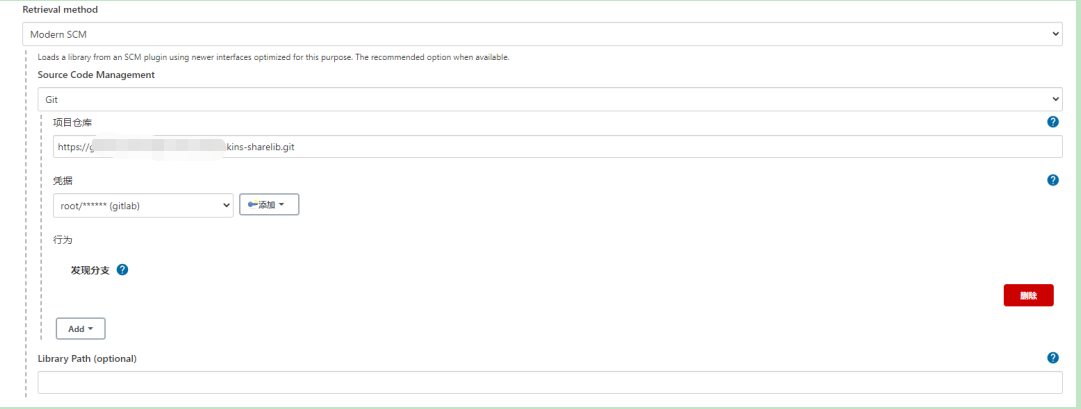
- 编写jenkinsfile
在Jenkinsfile中使用@Library('jenkins-sharelib-tools') _来加载共享库,注意后面符号_用于加载。类的实例化def tools = new org.devops.tools(),使用类中的方法tools.PrintMes("获取代码",'green')
#!groovy
@Library('jenkins-sharelib-tools') _
def tools = new org.devops.tools()
pipeline {
agent { node { label "master" }}
stages {
//下载代码
stage("GetCode"){
steps{
timeout(time:5, unit:"MINUTES"){
script{
tools.PrintMes("获取代码",'green')
hello.call()
}
}
}
}
}
}#!groovy
@Library('jenkins-sharelib-tools') _
def tools = new org.devops.tools()
pipeline {
agent { node { label "master" }}
stages {
//下载代码
stage("GetCode"){
steps{
timeout(time:5, unit:"MINUTES"){
script{
tools.PrintMes("获取代码",'green')
hello.call()
}
}
}
}
}
}- 创建一个pipeline
我们流水线的类型,选择Pipeline script from SCM。我们配置一个gitlab的仓库然后将jenkinsfile放入
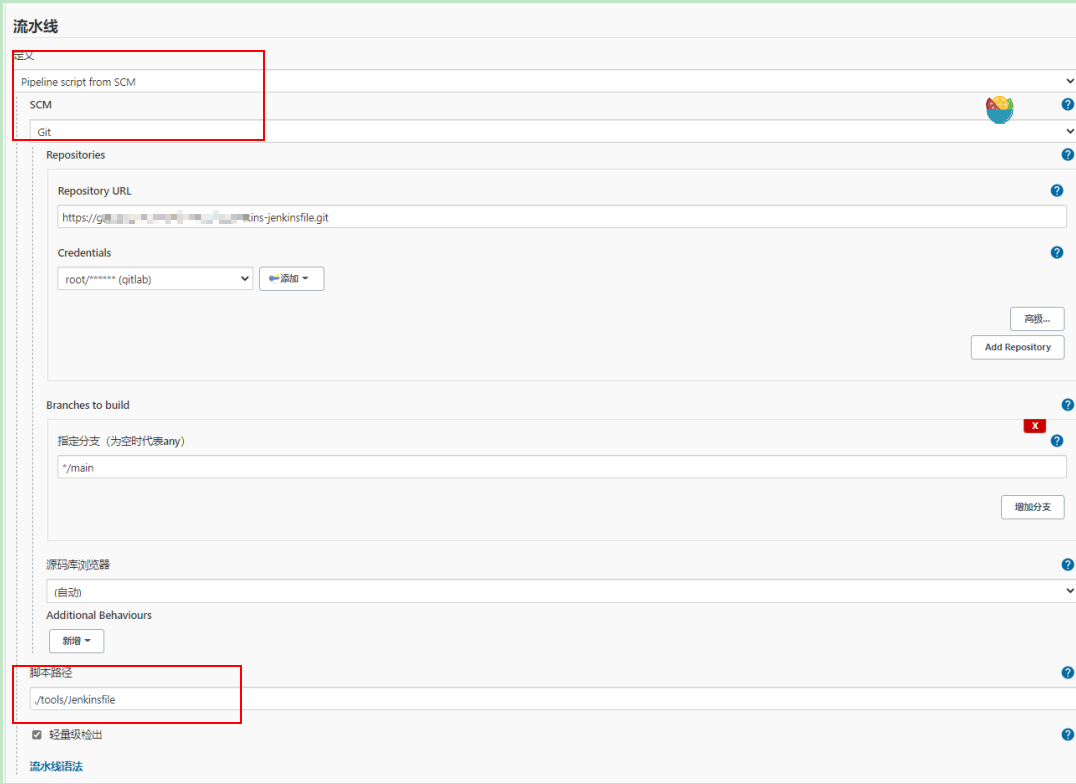
注意, 我们在同一个仓库下可以添加多个jenkinsfile,可以用名字来区分,也可以建多个路径,比如我放到tools路径下面,就需要配置
./tools/Jenkinsfile.之前的共享库,其实也可以在org路径下,放多个文件,适用于不同的情况
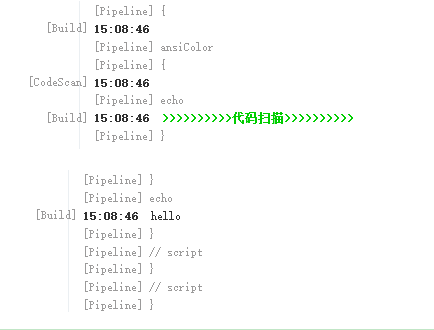
5.2gitlab
官方文档,https://docs.gitlab.com/ee/api/branches.html
- postman 调试

- 在jenkins中操作
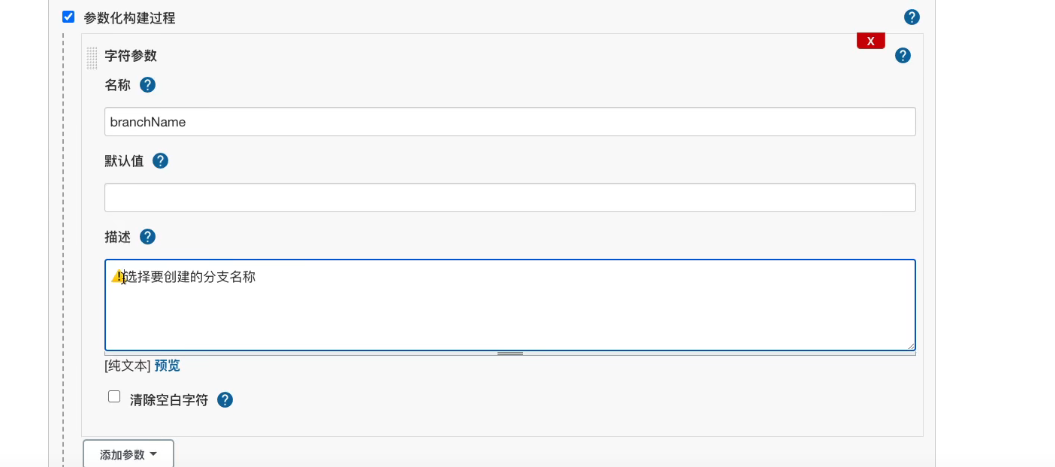

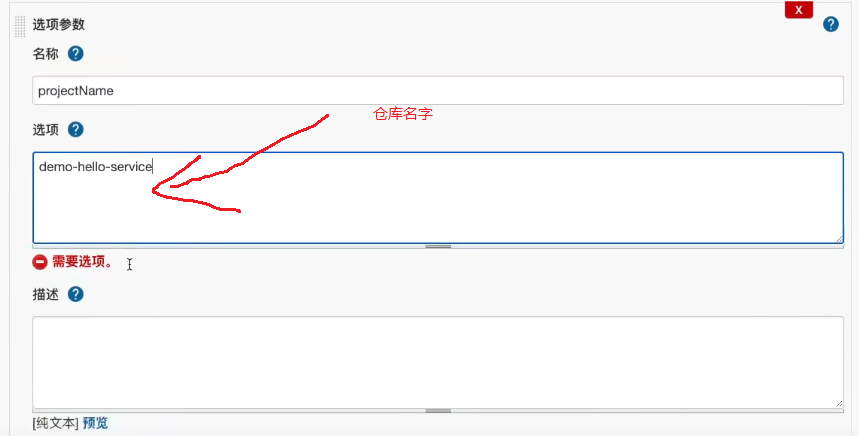

- 配置gitlab token
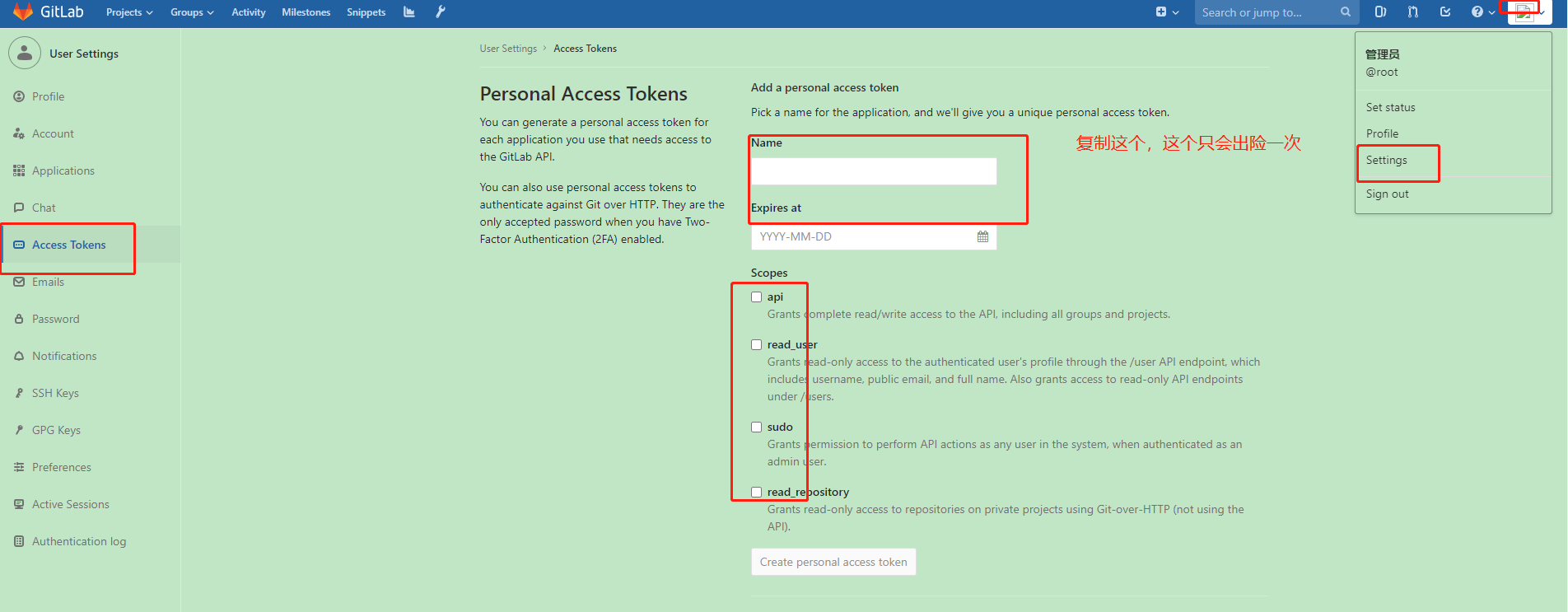
- 配置jenkins token
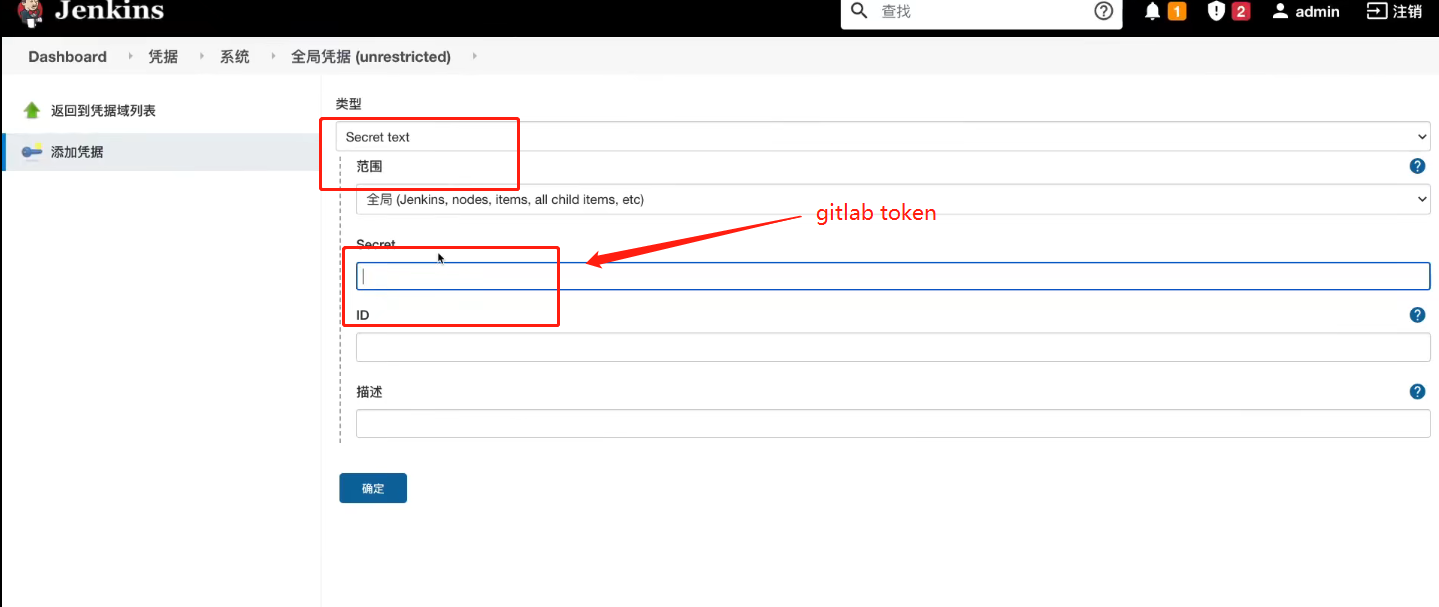
- 生成pipeline
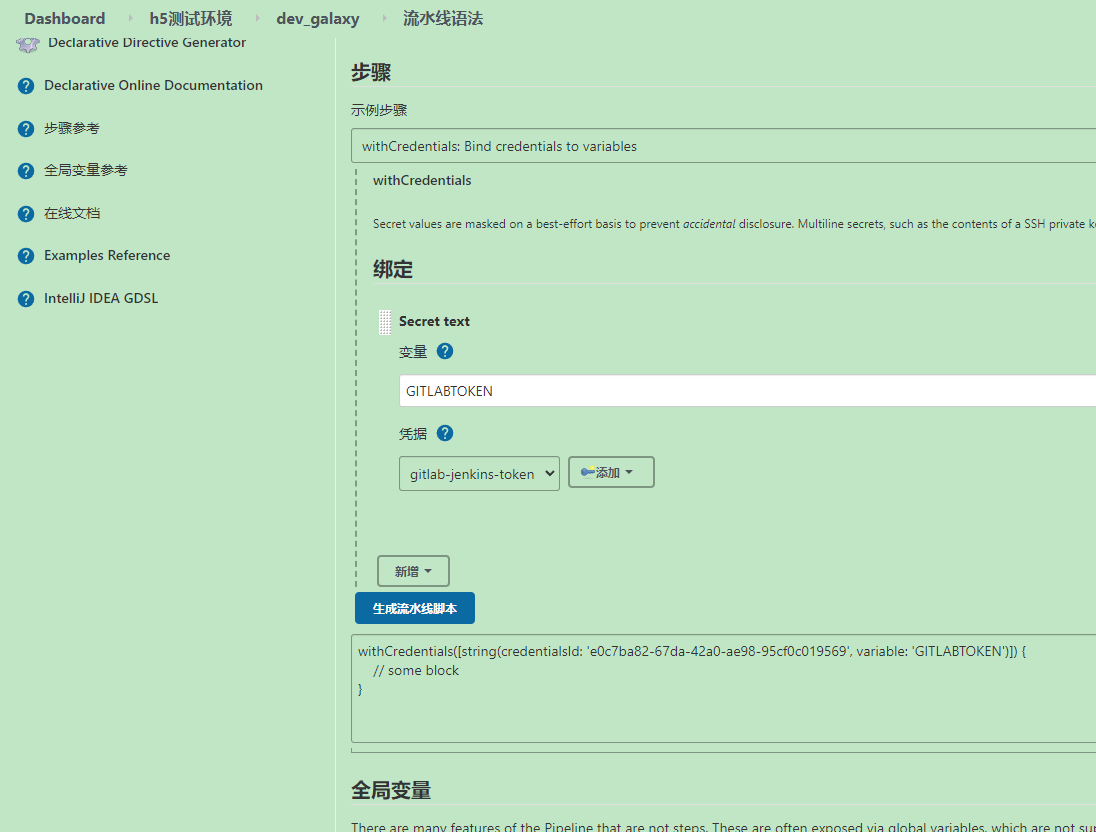
withCredentials([string(credentialsId: 'e0c7ba82-67da-42a0-ae98-95cf0c019569', variable: 'GITLABTOKEN')]) {
// some block
}withCredentials([string(credentialsId: 'e0c7ba82-67da-42a0-ae98-95cf0c019569', variable: 'GITLABTOKEN')]) {
// some block
}- 完整代码
vi Jenkinsfile
@Library("sharelib") _
//导入
def gitab = new org.devops.gitlab()
pipeline {
agent { label "master"}
stages{
stage("test"){
steps{
script{
/*withCredentials([string(credentialsId: 'e0c7ba82-67da-42a0-ae98-95cf0c019569', variable: 'GITLABTOKEN')]) {
sh """
//Create branch
curl --location \
--request POST \
"http://192.168.1.22/api/v4/projects/2/repository/branches?branch=${env.branchName}&ref=${env.baseBranch}" \
--header "PRIVATE-TOKEN: ${GITLABTOKEN}"
"""
}*/
projectId = GetprojectId(${env.projectName}")
CreateBranch(projectId, "${env.branchName}", "${env.baseBranch}")
/*
projectId = gitlab.GetprojectId(${env.projectName}")
gitlab.CreateBranch(projectId, "${env.branchName}", "${env.baseBranch}")
*/
}
}
}
}
}
//
def HttpReq(apiURL, method){
gitlabURL = "http://192.168.1.22/api/v4"
withCredentials([string(credentialsId: 'e0c7ba82-67da-42a0-ae98-95cf0c019569', variable: 'GITLABTOKEN')]) {
response = sh returnStdout: true, script: """
//Create branch
curl --location \
--request POST \
"${gitlabURL}/${apiURL}" \
--header "PRIVATE-TOKEN: ${GITLABTOKEN}"
"""
}
return response
}
//创建分支
def CreateBranch(projectId, branchName, baseBranch){
apiURL = "projects/${projectId}/repository/branches?branch=${branchName}&ref=${baseBranch}"
HttpReq(apiURL, "POST")
/*withCredentials([string(credentialsId: 'e0c7ba82-67da-42a0-ae98-95cf0c019569', variable: 'GITLABTOKEN')]) {
sh """
//Create branch
curl --location \
--request POST \
"http://192.168.1.22/api/v4/projects/${projectId}/repository/branches?branch=${branchName}&ref=${baseBranch}" \
--header "PRIVATE-TOKEN: ${GITLABTOKEN}"
"""
}*/
}
//获取项目 id
def GetprojectId(projectName){
apiURL = "project?search=${projectName}"
result = HttpReq(apiURL, "GET")
result = readJSON test: result
return result[0]["id"]
/*withCredentials([string(credentialsId: 'e0c7ba82-67da-42a0-ae98-95cf0c019569', variable: 'GITLABTOKEN')]) {
sh """
//Create branch
curl --location \
--request POST \
"http://192.168.1.22/api/v4/projects/${projectId}/repository/branches?branch=${branchName}&ref=${baseBranch}" \
--header "PRIVATE-TOKEN: ${GITLABTOKEN}"
"""
}*/
}@Library("sharelib") _
//导入
def gitab = new org.devops.gitlab()
pipeline {
agent { label "master"}
stages{
stage("test"){
steps{
script{
/*withCredentials([string(credentialsId: 'e0c7ba82-67da-42a0-ae98-95cf0c019569', variable: 'GITLABTOKEN')]) {
sh """
//Create branch
curl --location \
--request POST \
"http://192.168.1.22/api/v4/projects/2/repository/branches?branch=${env.branchName}&ref=${env.baseBranch}" \
--header "PRIVATE-TOKEN: ${GITLABTOKEN}"
"""
}*/
projectId = GetprojectId(${env.projectName}")
CreateBranch(projectId, "${env.branchName}", "${env.baseBranch}")
/*
projectId = gitlab.GetprojectId(${env.projectName}")
gitlab.CreateBranch(projectId, "${env.branchName}", "${env.baseBranch}")
*/
}
}
}
}
}
//
def HttpReq(apiURL, method){
gitlabURL = "http://192.168.1.22/api/v4"
withCredentials([string(credentialsId: 'e0c7ba82-67da-42a0-ae98-95cf0c019569', variable: 'GITLABTOKEN')]) {
response = sh returnStdout: true, script: """
//Create branch
curl --location \
--request POST \
"${gitlabURL}/${apiURL}" \
--header "PRIVATE-TOKEN: ${GITLABTOKEN}"
"""
}
return response
}
//创建分支
def CreateBranch(projectId, branchName, baseBranch){
apiURL = "projects/${projectId}/repository/branches?branch=${branchName}&ref=${baseBranch}"
HttpReq(apiURL, "POST")
/*withCredentials([string(credentialsId: 'e0c7ba82-67da-42a0-ae98-95cf0c019569', variable: 'GITLABTOKEN')]) {
sh """
//Create branch
curl --location \
--request POST \
"http://192.168.1.22/api/v4/projects/${projectId}/repository/branches?branch=${branchName}&ref=${baseBranch}" \
--header "PRIVATE-TOKEN: ${GITLABTOKEN}"
"""
}*/
}
//获取项目 id
def GetprojectId(projectName){
apiURL = "project?search=${projectName}"
result = HttpReq(apiURL, "GET")
result = readJSON test: result
return result[0]["id"]
/*withCredentials([string(credentialsId: 'e0c7ba82-67da-42a0-ae98-95cf0c019569', variable: 'GITLABTOKEN')]) {
sh """
//Create branch
curl --location \
--request POST \
"http://192.168.1.22/api/v4/projects/${projectId}/repository/branches?branch=${branchName}&ref=${baseBranch}" \
--header "PRIVATE-TOKEN: ${GITLABTOKEN}"
"""
}*/
}